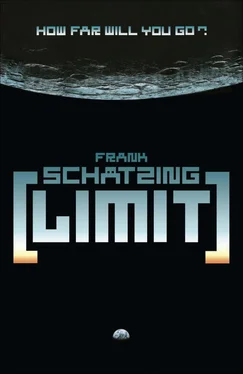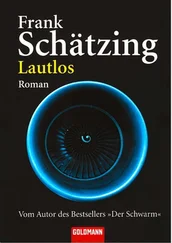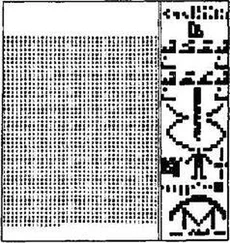But the most remarkable thing was that Evelyn Chambers received all these impressions without touching the room or its furniture with a single cell of her body. Just as naked as the choice combination of Spanish, Indian and North American genes had made her, flattered by nothing but fresh air, set to a pleasant 21 degrees Celsius, she floated above the curved, three-metre panoramic front window, and looked at a starry sky of such ineffable clarity and opulence that it could only have been a dream. Shimmering just under 36,000 kilometres below her was the Earth, the work of an Impressionist artist.
It must be a dream.
But Evelyn wasn’t dreaming.
Since her arrival the previous day she couldn’t get enough of her far-away home. There was nothing to obstruct the view, no looming lattice mast, no antenna, no module, not even the space elevator cable running towards the nadir. In a quiet voice she said, ‘Lights out,’ and the lights went out. There was, indeed, a manual remote control for the service systems, but she didn’t want to risk changing her perfect position by waving the thing around. After fifteen hours on board the OSS she had slowly started to get used to weightlessness, even though she was deeply unsettled by the lack of up and down. She was all the more surprised not to have fallen victim to the space sickness people talked about, unlike Olympiada Rogacheva, who lay strapped tightly to her bed, whimpering and wishing she had never been born. Evelyn, on the other hand, felt pure bliss, like the memory of Christmas, pure delight distilled into a drug.
She barely dared breathe.
Staying poised over a single point wasn’t easy, she noted. In a state of weightlessness you involuntarily assumed a kind of foetal position, but Evelyn had stretched her legs and crossed her arms in front of her chest like a diver propelling himself over a reef. Any hasty movement might mean that she would start spinning, or drift away from the glass. Now that all the light had gone out and the room, furniture included, had half vanished, every cell of her brain wanted to savour the illusion that there was no protecting shell surrounding her, that she was in fact floating like Kubrick’s star-child, naked and alone above this wondrously beautiful planet. And suddenly she saw the tiny, shimmering little ball spinning away and realised that her eyes had filled with tears.
Was this how she had imagined the whole thing? Had she been able to imagine anything at all twenty-four hours ago, when the helicopter came down over the platform in the sea and the travellers got out, the night tugging at their coats and a magnificent sunrise failing to attract anyone’s attention?
* * *
From a distance the platform looked imposing and mysterious, and even a little scary; now they are actually there it exerts a fascination of a quite different and much deeper kind. First the feeling hits that this isn’t Disneyland and there’s no going back, that they will soon be swapping this world for a different, alien one. Evelyn isn’t surprised to see some members of the group repeatedly looking across at the Isla de las Estrellas. Olympiada Rogacheva, for example, Paulette Tautou – even Momoka Omura casts stolen glances at the ragged cliffs, where the lights of the Stellar Island Hotel are beaming with an unexpectedly cosy radiance, as if warning them to leave this nonsense and come home, to freshly squeezed fruit-juices, sun-cream and the cries of gulls.
Why us? she asks herself irritably. Why is it always the women who get queasy at the idea of getting into the lift? Are we really such cowardy-custards? Forced by evolution into the role of worry-warts because nothing must be allowed to endanger the brood, while males – dispensable once robbed of their sperm – can advance calmly into the unknown and die there? At that moment she notices that Chuck Donoghue is sweating an unusual amount, Walo Ögi is displaying distinct signs of nerves, she sees the tense expectation on Heidrun Ögi’s face, Miranda Winter’s childlike enthusiasm, the intelligent interest in Eva Borelius’ eyes, and is reconciled to her circumstances. Together they walk up to the multi-storey cylinder of the terminal, and all of a sudden she realises why she was getting agitated before.
Embarrassing – but even she is utterly terrified.
‘To be perfectly honest,’ says Marc Edwards, who is walking along beside her, ‘I don’t have a very good feeling about this.’
‘You don’t?’ Evelyn smiles. ‘I thought you were an adventurer.’
‘Hmm.’
‘That’s what you said on my show, at least. Diving into shipwrecks, diving into caves—’
‘I suspect this is going to be different from diving.’ Edwards stares pensively at his right index finger, its first joint missing. ‘Completely different.’
‘Incidentally, you never told me how that happened.’
‘I didn’t? A puffer-fish. I annoyed him, on a reef off Yucatán. If you tap them on the nose they get angry, retreat and inflate themselves. I kept tapping him’ – Edwards pesters an imaginary puffer-fish – ‘except there was coral everywhere, he couldn’t get any further back, so the next time I did it he just opened his mouth. My finger disappeared into it for a moment. Yeah. You should never try to pull your finger out of a fish’s mouth, certainly not by force. By the time I pulled it out again, there was just a bone sticking out.’
‘You won’t have to worry about things like that up there.’
‘No.’ Edwards laughs. ‘It’ll probably be the safest holiday of our lives.’
They enter the terminal. It’s perfectly circular, and looks even bigger from inside than it seemed from outside. High-powered spotlights illuminate two structures, one in front of the other, identical in every detail but mirror images of one another. At the centre of each the cable stretches vertically upwards from its mooring in the ground, surrounded by three barrel-shaped mechanisms oscillating in appearance between cannons and searchlights, their muzzles pointing to the sky. A double grille runs around each of the structures to head height. Its mesh is wide enough for a person to slip through, but its presence indicates quite clearly that this would be a bad idea.
‘And you know why?’ Julian calls, in a dazzlingly good mood. ‘Because direct contact with the cable can cost you a body-part in a fraction of a second. You must bear in mind that it’s thinner than a razor-blade, but incredibly hard. If I ran a screwdriver over the outside edge, I could slice it to shreds. Does anyone want to have a go with a finger? Does anyone want to get rid of their partner?’
Evelyn can’t help thinking of what a journalist once said: ‘Julian Orley doesn’t go on stage, the stage follows him around.’ Accurate, but the truth still looks a bit different. You actually trust the guy, you believe every single word he says, because his confidence is enough on its own to dissolve doubts, ifs and buts, nos and maybes, like sulphuric acid.
Motionless, and about twenty metres above the ground, the two lifts dangle like insects from the cables. From close to they look less like space shuttles, not least because they have no wings or tail-planes. Instead, what you notice is the wide undersides, mounted with photovoltaic cells. Compared with two days ago, when they came back from orbit, their appearance has changed slightly, in that the tanks of liquid helium-3 have been swapped for rounded, windowless passenger modules. Walkways lead from a high balustrade to open entrance hatches in the bellies of the cabins.
‘Your technology?’ asks Ögi, walking along beside Locatelli, eyes on the lifts’ solar panels.
Locatelli stretches, becoming half an inch taller. Evelyn can’t help thinking of the late Muammar al-Gaddafi. The similarity is startling, and so is the monarchical posture.
Читать дальше












